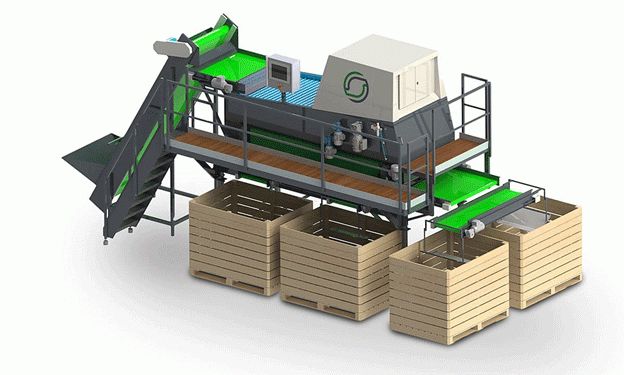The agriculture industry is evolving rapidly, and advancements in technology are offering new ways to improve efficiency and sustainability. Tolsma-Grisnich, a key player in this transformation, is set to highlight its latest innovations at InterPom’24. These include the Optica Q optical quality sorter, designed to reduce labor requirements significantly, and energy-saving ventilation and refrigeration systems for potato storage.
The Optica Q Optical Quality Sorter: Cutting Labor Costs While Maintaining High Throughput
The Optica Q is a breakthrough for potato processing, specifically engineered to handle seed potatoes at an impressive rate. It can sort 15 to 18 tons of seed potatoes per hour, equating to the inspection capacity of three human workers. This high throughput not only allows processors to cut down on labor costs but also opens doors for better efficiency and quality control in the sorting process. Each seed potato is analyzed for optimal value, maximizing the return on harvests.
For farm owners and operators facing labor shortages or striving for higher productivity, the Optica Q presents a compelling solution. Automated quality sorting ensures consistency and reduces the likelihood of errors, setting a new standard in potato processing. As labor markets tighten globally, investing in automation technologies like Optica Q could make the difference between keeping up with market demands or falling behind.
Energy-Saving Storage Solutions: Addressing Rising Energy Costs
Beyond labor efficiency, Tolsma-Grisnich is also focused on reducing energy usage in potato storage. The company’s specialists will showcase advanced ventilation and refrigeration systems that use natural refrigerants, which are both eco-friendly and cost-effective. Energy consumption in food storage is a major concern, especially as global energy prices remain volatile. Integrating energy-efficient solutions ensures that stored produce maintains quality while reducing environmental impact and operational costs.
Research has shown that using efficient climate control systems in storage facilities can reduce energy consumption by up to 30% compared to conventional methods. Tolsma-Grisnich’s systems are designed to optimize airflow and refrigeration cycles, minimizing energy waste and maintaining ideal storage conditions for extended periods.
A Vision for Sustainable Growth
Dim-Jan de Visser, CEO of Tolsma-Grisnich, emphasizes the company’s commitment to supporting sustainable agricultural practices. By investing in technologies that optimize resource use and improve productivity, Tolsma-Grisnich aims to contribute to a more resilient and future-proof food system. At InterPom, farmers, agronomists, and agricultural engineers will have the opportunity to explore these cutting-edge solutions and discuss their implementation directly with experts.
As the agriculture industry continues to face challenges from climate change, labor shortages, and rising costs, innovative solutions like the Optica Q and energy-efficient storage systems are more critical than ever. These technologies represent a significant step toward a more sustainable and efficient food production system.
Tolsma-Grisnich’s innovations exemplify how the agricultural sector can harness technology to improve efficiency, reduce labor dependencies, and lower energy consumption. For farmers and industry professionals, adopting these advanced systems could be the key to maintaining competitiveness and achieving long-term sustainability in their operations.







